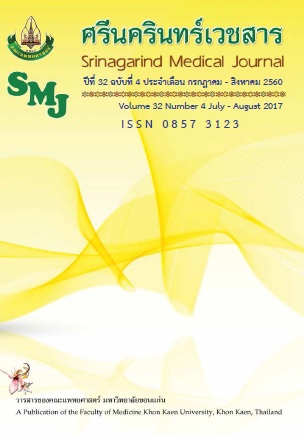In Vitro Antimicrobial Activities of Natural Extracts of Sida Tomato and Cherry Tomato against Microbial Pathogens
Keywords:
Antimicrobial activity, Cherry tomato, Sida tomato, Natural extract, ฤทธิ์ต้านจุลชีพ, มะเขือเทศราชินี, มะเขือเทศสีดา, สารสกัดธรรมชาติAbstract
Background and Objective: The tomato fruits possess vital nutrients for health. However, there was no report about antimicrobial activity of their extracts. The objective of this research was to study the antimicrobial activities of steriled water and ethanol extracts of Cherry tomato and Sida tomato on six microbes including Staphylococcus aureus, Streptococcus pyogenes, Escherichia coli, Pseudomonas aeruginosa, Candida albicans and Candida tropicalis.
Material and Method: Antimicrobial susceptibility was examined by Broth Tube Dilution Method. Dilutions of the extracts were made in a liquid medium which was inoculated with a standardized number of microbes and incubated overnight. Read the lowest concentration of tube extract preventing appearance of turbidity is considered to be the minimal inhibitory concentration (MIC).
Results: The aqueous extract of Cherry tomatoes and Sida tomatoes could inhibit only S. pyogenes, with MIC of 25 and 22.5 g/mL, respectively. For the six pathogens studied, ethanolic extract of Sida tomato inhibited S. pyogenes best, followed by P. aeruginosa, E. coli and C. tropicalis, with MIC values of 0.3, 0.6, 0.7 and 0.83 g/mL, respectively. The ethanol extracts of Cherry tomato inhibited P. aeruginosa and S. pyogenes, with MIC of 0.6 and 0.7 g/mL, respectively.
Conclusion: The ethanolic extracts of natural tomato fruits demonstrated better inhibition to the tested important microbial pathogens rather than their aqueous extracts.
ฤทธิ์นอกกายของสารสกัดผลมะเขือเทศสีดาและผลมะเขือเทศราชินีในการต้านจุลชีพก่อโรค
นิรมล ธรรมวิริยสติ1*, นันทา คุมคณะ2, 3, พฤกษา อินนอก2, จิราพร จรอนันต์1
1สาขาเทคนิคการแพทย์ คณะสหเวชศาสตร์ มหาวิทยาลัยบูรพา
2สาขาวิทยาศาสตร์การแพทย์ คณะสหเวชศาสตร์ มหาวิทยาลัยบูรพา
3สาขาวิชาโภชนาการคลินิก ภาควิชาอายุรศาสตร์ คณะแพทย์ศาสตร์ศิริราชพยาบาล มหาวิทยาลัยมหิดล
หลักการและวัตถุประสงค์: โภชนาการของผลมะเขือเทศอุดมไปด้วยคุณค่าต่อสุขภาพ แต่อย่างไรก็ตามยังไม่มีการศึกษาเปรียบเทียบฤทธิ์ของสารสกัดต่อการต้านจุลชีพที่เด่นชัด ในการศึกษาครั้งนี้จึงมีวัตถุประสงค์เพื่อทดสอบฤทธิ์ต้านจุลชีพของสารสกัดผลมะเขือเทศราชินีและผลมะเขือเทศสีดาที่สกัดด้วยน้ำปราศจากเชื้อและเอทานอล ต่อเชื้อ Staphylococcus aureus, Streptococcus pyogenes, Escherichia coli, Pseudomonas aeruginosa, Candida albicans และ Candida tropicalis
วิธีการศึกษา: ทดสอบความไวของเชื้อต่อสารสกัดผลมะเขือเทศด้วยวิธี Broth Tube Dilution โดยเจือจางสารสกัดในอาหารเลี้ยงเชื้อเหลว เติมเชื้อที่มีความเข้มข้นมาตรฐานลงในหลอดที่ความเข้มข้นของสารสกัดต่าง ๆ บ่มเชื้อข้ามคืน อ่านค่าความเข้มข้นต่ำสุดของสารสกัดที่สามารถยับยั้งความขุ่นในการเจริญของเชื้อ แสดงเป็นค่า MIC (Minimal Inhibitory Concentration)
ผลการศึกษา: สารสกัดผลมะเขือเทศราชินีและผลมะเขือเทศสีดาด้วยน้ำปราศจากเชื้อแสดงฤทธิ์ยับยั้ง S. pyogenes ได้ใกล้เคียงกัน มีค่า MIC เท่ากับ 25 และ 22.5 กรัมต่อมิลลิลิตร ตามลำดับ สารสกัดผลมะเขือเทศสีดาด้วยเอทานอลยับยั้ง S. pyogenes ได้ดีที่สุด มีค่า MIC เท่ากับ 0.3 กรัมต่อมิลลิลิตร รองลงมาคือ P. aeruginosa E. coli และ C. tropicalis โดยมีค่า MIC เท่ากับ 0.6, 0.7 และ 0.83 กรัมต่อมิลลิลิตร ตามลำดับ สารสกัดมะเขือเทศราชินีด้วยเอทานอลแสดงฤทธิ์ยับยั้ง P. aeruginosa และ S. pyogenes มีค่า MIC เท่ากับ 0.6 และ 0.7 กรัมต่อมิลลิลิตร ตามลำดับ
สรุป: ประสิทธิภาพในการสกัดผลมะเขือเทศสุกสดด้วยเอทานอลสามารถยับยั้งจุลชีพก่อโรคที่สำคัญบางชนิดได้ดีและหลากหลายกว่าการสกัดด้วยน้ำ




